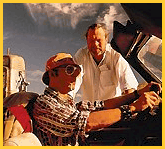What led you to use animatronics instead of CGI in your presentation of the "lounge lizards"?
Gilliam: Well, [creature creator] Rob Bottin was so keen on participating in the project that he worked for a lot less money than he normally does! We did use a lot of CGI elsewhere in the film, but the animatronics were a way of getting through a room full of lizard people. We only had eight lizards for that scene, so we had to use some tricks to fill out the room, like doing multiple passes in a room full of mirrors so we could get reflections of reflections real smoke-and-mirrors stuff.In some other scenes, we opted to use CGI such as a sequence in which a reception clerk, played by Katherine Helmond, turns into a moray eel. During the shot, her neck begins to swell and her mouth changes shape.
The book has a bit of an existential bent, with political overtones. Did you use any symbolism to convey those aspects of the narrative?
Gilliam: The television is on all the time in the film, so you constantly get bits of news reports about the war in Vietnam. It's a bit ironic: the story takes place in Vegas, and the only thing close to reality there is the television, which has always been the great distorter of reality!
One of the things that I don't think other scripts have captured about the book is its reflective nature. It's a book about loss: the Sixties didn't pay off the way Hunter obviously had hoped they would. The country was still deep in a war, and Nixon was in the White House. There's a beautiful passage in the book called the 'wave speech,' and we included that in the movie. Johnny, as Duke, is in his hotel room at night, and he goes over to the windows and opens the curtains; we then cut to documentary footage of the time, with no cleverness behind it. I'd originally considered using all of these effects, such as the room floating behind Duke and all of these images being projected onto the walls, but in the end I felt that it was better to just do it straight. Sometimes it's best not to be clever.
Hunter Thompson has a brief cameo in the film. What were your personal impressions of him?
Gilliam: He is exactly as he presents himself on the printed page; he's created his own persona. I would not want to live the way he has, but he's survived far beyond anyone else who has done those things to themselves. He's brilliant, a living icon, but he has to stand up to his reputation, which is hard work. He really is an extraordinary character.
When you're filming a book by an author who's still alive, there's a terrible pressure to get it right. But at the same time, you don't want to be too cautious and just do an earnest replication of the book. We were making a movie, and we had to make real choices. I felt an obligation to do my interpretation of the book. I didn't want to be restricted by thoughts of how Hunter would have done the book if he were a filmmaker.
